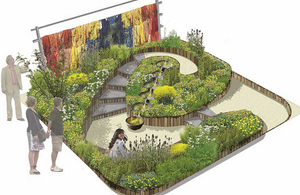Chelsea garden highlights project to mimic colours of nature
An innovative project to mimic the dynamic colours of nature and create a new range of paints is being promoted at Chelsea Flower Show.

The AkzoNobel Honeysuckle Blue Garden
A garden at this year’s Chelsea Flower Show is highlighting an Innovate UK-funded project led by AkzoNobel to develop decorative paints that mimic the vivid colours of nature.
The AkzoNobel Honeysuckle Blue Garden has been designed by Dutch fabric artist Claudy Jongstra in collaboration with Dutch garden and landscape designer Stefan Jaspers.
It is part of the Farm of the World initiative in which designers are collaborating with educational groups to teach sustainable techniques of using plants to create dyes to colour fabric.
The garden features plants that were historically harnessed for their dyes. It is sponsored by the leading global paints and coatings company AkzoNobel, whose brands include Dulux.
Nature’s colours are achieved through structures
AkzoNobel is working with the Natural History Museum and the University of Sheffield on an Innovate UK-funded project to develop decorative paints that mimic the colours produced in nature.
AkzoNobel paint research associate Phil Taylor said that in paint, colour and white were achieved through mostly man-made pigments. However, in nature, colours were achieved entirely differently through structures such as petals or feathers that generated effects.

Dr Andy Parnell, of Sheffield University, and Phil Taylor, of AkzoNobel, at the Chelsea garden.
Phil added:
For Dulux colour is vital. In the plant kingdom colour is also key, so the garden is a great opportunity for us to showcase the importance of colour.
If you walk along a river and see a kingfisher fly past, there is something about the blue that is alive. It has a depth to it, something vivid to it. We can get close to it, but there is something more special about the colours around us.
If we can harness that, could we offer a greater colour range, something more exciting and lifelike? The Natural History Museum has helped us identify which plants and animals have interesting whites and blues. The University of Sheffield have analysed the structures in those species that nature has evolved to give you the white and the blues.
The next challenge is, can the scientists make those structures in the test tube? Can you mimic in the test tube what nature has done? That’s what they are doing at the moment.
Researchers will look at mimicking nature in paint
If successful, researchers will then have to demonstrate that it is possible to mimic these structures in paint and maintain the effect. The final challenge is whether that process could be scaled up to industrial-scale production.
It is a long-term project, but the basic science will be publicly available so it could also be used by organisations working with colour in other areas.
See how Innovate UK support is helping businesses achieve success.